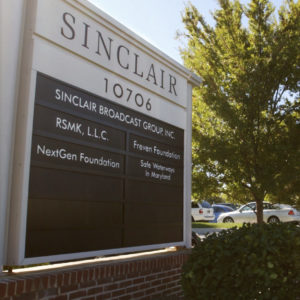Unlikely allies in the cable, satellite, news, consumer protection, and regulatory sectors joined forces Monday to oppose Sinclair Broadcast Group’s pending purchase of Tribune Media, a merger they say would create the largest operator of local broadcast stations in the country with unchecked influence and market power.
If the $3.9 billion Sinclair-Tribune merger gets regulatory approval, Sinclair would own more than 200 television stations, including over 130 stations affiliated with the four biggest broadcast networks in the U.S.; ABC, CBS, NBC and Fox. That would let Sinclair, which has received criticism for it’s right-leaning editorial news content, reach 72 percent of American households and own TV stations in 108 of all 210 TV markets, including 40 out of the top 50.
That creates a problem when it comes to providing the public with accurate, fair, and balanced news content, according to former Democratic FCC Commissioner Michael Copps, who was appointed by former President George W. Bush in 2001 and served until 2011. The FCC is the agency reviewing the merger.
“No one company should have such power over the news and information that citizens must have to successfully practice the art of self-government,” Copps told reporters on a Monday call. “And that doesn’t even get into the vices of this particular company.”
Sinclair’s practice of disseminating conservative “must-run” news packages and editorials to its 170-plus local news stations around the country has been highlighted recently in mainstream media, Congress, and even HBO’s “Last Week Tonight with John Oliver.”
“No other major owner of TV stations distributes its own commentary segments to run during local news,” Oliver said in July, referencing hard-right editorials by former Sinclair executive Mark Hyman that Sinclair-owned stations must broadcast.
The combined Sinclair-Tribune audience would reach 2.2 million American households, more than prime time cable Fox News programs like “The Five” and “Tucker Carlson Tonight.”
Copps thinks Sinclair is “the most dangerous company most Americans have never heard of,” and he isn’t alone. Matthew Polka, president and CEO of American Cable Association, a trade group representing some 800 small and rural cable companies, said the merger would give Sinclair the power to raise prices for transmitting its content. Those price hikes, he warned, would be passed on to consumers.
“The Sinclair-Tribune merger, as proposed, is unlawful and not in the public interest, and should be rejected,” Polka said. While the FCC often imposes conditions on large mergers to safeguard against antitrust and monopoly concerns, Polka emphasized no conditions could mitigate the merger’s “harms.”
“It must be denied,” he said, noting Sinclair only bothered to file three pages to the FCC on the merger’s purported benefits to consumers.
One America News Network President Charles Herring, Ed Black of the Computer and Communications Industry Association — a tech sector non-profit — and CEO Steven K. Berry of the Competitive Carriers Association, a trade group for small wireless providers, echoed those concerns. Jeff Blum, senior vice president and deputy general counsel for DISH had a scheduling conflict, but in a statement after the call said the merger would mean higher prices and shrinking local news coverage.
“Sinclair will be able to leverage its unprecedented market power to demand increasing fees from pay-TV providers, forcing consumers to pay higher prices,” Blum’s statement reads. “A combined Sinclair-Tribune will harm localism, including by scaling back local news operations and consolidating, duplicating, or even replacing local news programming.”
All will soon file petitions with the FCC asking the agency to deny the merger request based on agency rules against consolidated media ownership and the FCC’s public interest standard, which requires mergees to prove the deal will benefit the public.
But many worry the Republican-controlled FCC won’t give the merger the scrutiny it warrants. Some even accuse the agency of directly facilitating the merger with recent changes to rules like the “UHF discount,” a loophole closed under the Democrat-led FCC during the Obama administration. The decades-old loophole allows one corporation to own more stations than the cap of 39 percent nationwide as a result of technical specifications long-since outdated.
Jared Kushner, White House adviser and son-in-law to President Donald Trump, said the Trump campaign made a deal with Sinclair for better coverage of Trump during the 2016 campaign, according to Politico. Many of Sinclair’s stations broadcast in swing states like Wisconsin, Ohio, and Pennsylvania.
During a congressional hearing in July Republican FCC Chairman Ajit Pai, Trump’s appointee to lead the agency (who reinstated the UHF discount shortly after taking office) said no one from the administration has discussed the merger with him.
“They’ve not asked me to take any particular action or expressed views on the merits, and certainly not with respect to the UHF discount,” Pai testified. “If you look at any of our regulatory actions, they’re not designed to benefit any particular company or segment of the industry.”

